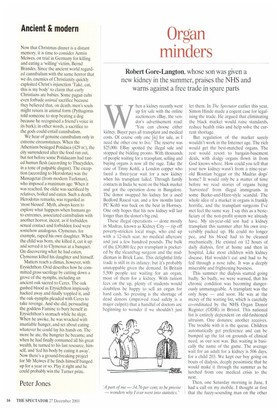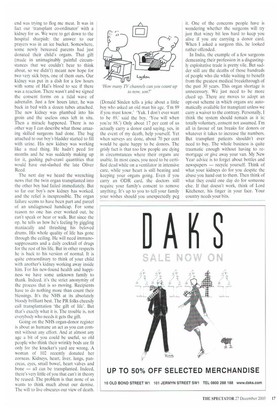Organ minders
Robert Gore-Langton, whose son was given a new kidney in the summer, praises the NHS and warns against a free trade in spare parts Ivhen a kidney recently went up for sale with the online auctioneers eBay, the vendor's advertisement read: 'You can choose either kidney. Buyer pays all transplant and medical costs. Of course only one [is] for sale, as I need the other one to live.' The reserve was $25,000. EBay spotted the illegal sale and stopped the bidding pronto. With thousands of people waiting for a transplant, selling and buying organs is now all the rage. Take the case of Tinny Kohli, a London copper who faced a three-year wait for a new kidney when his transplant failed. Through family contacts in India he went on the black market and got the operation done in Bangalore. The donor swapped his kidney for a used Bedford Rascal van, and a few months later PC Kohli was back on the beat in Hornsey. One only hopes that his new kidney will last longer than the donor's big end.
These illegal operations — done mostly in Madras, known as Kidney City — rip off poverty-stricken local mugs, who end up with a 12-inch scar. no medical aftercare and just a few hundred pounds. The bulk of the £30,000 fee per transplant is pocketed by the sleazebag surgeon and the middleman in Brick Lane. This delightful little trade is still in its infancy; but it's probably unstoppable given the demand. In Britain 5,500 people are waiting for an organ, most of them for a kidney. With tuition fees on the up, plenty of students would doubtless be happy to sell an organ for hard cash. So pressing is the shortage of dead donors (improved road safety is a major culprit) that a handful of doctors are beginning to wonder if we shouldn't just
let them. In The Spectator earlier this year, Simon Hinde made a cogent case for legalising the trade. He argued that eliminating the black market would raise standards, reduce health risks and help solve the current shortage.
But regulation of the market surely wouldn't work in the Internet age. The rich would get the best-matched organs. The rest would resort to bargain-basement deals, with dodgy organs flown in from God knows where. How could you tell that your new kidney wasn't from a nine-yearold Bosnian beggar or the Madras dogs' home? It would only be a matter of time before we read stories of organs being 'harvested' from illegal immigrants in some Burke-and-Hare-style scandal. The whole idea of a market in organs is frankly horrific, and the transplant surgeons I've met feel the same way. I say this as a beneficiary of the non-profit system we already have. My six-year-old son had a kidney transplant this summer after his own irreversibly packed up. He could no longer pee, and his blood had to be cleaned mechanically. He existed on 12 hours of daily dialysis, first at home and then in hospital. Like most children with kidney disease, Hal wouldn't eat and had to be fed through a nose tube. It was a deeply miserable and frightening business.
This summer the dialysis started going badly. So badly, we were warned, that his chronic condition was becoming dangerously unmanageable. A transplant was the only hope — and soon. He was at the mercy of the waiting list, which is carefully co-ordinated by the NHS Organ Donor Register (ODR) in Bristol. This national list is entirely dependent on old-fashioned altruism. One donates; another receives. The trouble with it is the queue. Children automatically get preference and can be bumped up the list on grounds of clinical need, as our son was. But waiting is basically the name of the game. The average wait for an adult for a kidney is 506 days, for a child 201 We kept our boy going on bouts of dialysis, deeply pessimistic that he would make it through the summer as he lurched from one medical crisis to the next.
Then, one Saturday morning in June, I had a call on my mobile. I thought at first that the fuzzy-sounding man on the other
end was trying to flog me meat. It was in fact our 'transplant co-ordinator' with a kidney for us. We were to get down to the hospital sharpish: the answer to our prayers was in an ice bucket. Somewhere, some newly bereaved parents had just donated their child's organs. That gift (made in unimaginably painful circumstances that we couldn't bear to think about, so we didn't) meant new hope for two very sick boys, one of them ours. Our kidney was put in a dish for a few hours with some of Hal's blood to see if there was a reaction. There wasn't and we signed the consent forms on a tidal wave of adrenalin. Just a few hours later, he was back in bed with a dozen tubes attached. The new kidney was plumbed into his groin and the useless ones left in situ. Then a miracle happened. There is no other way I can describe what those amazing skilled surgeons had done. The bag attached to our boy's bladder started to fill with urine. His new kidney was working like a mad thing. He hadn't peed for months and he was suddenly making up for it, gushing pub-crawl quantities that would have out-slashed the late Oliver Reed.
The next day we heard the wrenching news that the twin organ transplanted into the other boy had failed immediately. But so far our boy's new kidney has worked, and the relief is inexpressible. The organ failure seems to have been part and parcel of an undiagnosed handicap. For some reason no one has ever worked out, he can't speak or hear or walk. But since the op, he tells us how he's feeling by giggling maniacally and thrashing his beloved drums. His whole quality of life has gone through the ceiling. He will need immunosuppressants and a daily cocktail of drugs for the rest of his life. But in other respects he is back to his version of normal. It is quite extraordinary to think of your child with another's kidney working away inside him. For his new-found health and happiness we have some unknown family to thank. Indeed, it's the strict anonymity of the process that is so moving. Recipients have to do nothing more than count their blessings. It's the NHS at its absolutely bloody brilliant best. The PR folks cheesily call transplantation 'the gift of life'. But that's exactly what it is. The trouble is, not everybody who needs it gets the gift.
Going on the NHS organ-donor register is about as humane an act as you can commit without any effort. And at almost any age a bit of you could be useful, so old people who think their wrinkly bods are fit only for the knacker's yard are wrong. A woman of 102 recently donated her corneas. Kidneys, heart, liver, lungs, pancreas, eyes, small bowel, heart valves and bone — all can be transplanted. Indeed, there's very little of you that can't in theory be reused. The problem is that none of us wants to think much about our demise. The will to live obscures our view of death. (Donald Sinden tells a joke about a little boy who asked an old man his age. 'I'm 89 if you must know.Yuk. I don't ever want to be 89,' said the boy. 'You will when you're 88.') Only about 17 per cent of us actually carry a donor card saying, yes, in the event of my death, help yourself. Yet when surveys are done, about 70 per cent would be quite happy to be donors. The grisly fact is that too few people are dying in circumstances where their organs are usable. In most cases, you need to be certified dead while on a ventilator in intensive care, while your heart is still beating and keeping your organs going. Even if you carry an ODR card, the doctors still require your family's consent to remove anything. It's up to you to tell your family your wishes should you unexpectedly peg it. One of the concerns people have is wondering whether the surgeons will try just that wincy bit less hard to keep you alive if you are carrying a donor card. When I asked a surgeon this, he looked rather offended.
In India, the example of a few surgeons demeaning their profession in a disgustingly exploitative trade is pretty vile. But sadder still are the deaths of those hundreds of people who die while waiting to benefit from the greatest medical breakthrough of the past 30 years. This organ shortage is unnecessary. We just need to be more clued up. There are moves to adopt an opt-out scheme in which organs are automatically available for transplant unless we carry a waiver to the contrary. Personally, I think the system should remain as it is; totally voluntary, consent not assumed. I'm all in favour of tax breaks for donors or whatever it takes to increase the numbers. But transplant patients shouldn't ever need to buy. The whole business is quite traumatic enough without having to remortgage or give away your van. My New Year advice is to forget about bottles and newspapers — recycle yourself. Think of what your kidneys do for you despite the abuse you hand out to them. Then think of what they could one day do for someone else. If that doesn't work, think of Lord Kitchener, his finger in your face. Your country needs your bits.



























































 Previous page
Previous page